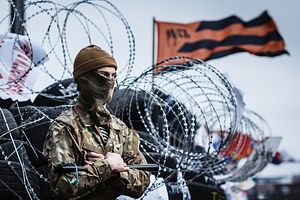Much of the recent attention of foreign fighters originating in Central Asia has focused, understandably, on those currently in Syria and Iraq. Although Moscow has largely over-hyped the breadth and impact of those who have linked up with Islamic State, hundreds from Central Asia have still made their way to and through the areas currently under IS control.
However, while there has been considerable hand-wringing about the potential ramifications of these fighters’ looming return, authorities and analysts have largely overlooked another conflict continuing to attract Central Asian nationals. As the ceasefire in eastern Ukraine falters, it appears that separatists’ abilities to attract non-Ukrainian citizens has not simply continued – Russian nationals remain among the leadership structures, and Chechens, Ossetians, and Americans, among others, redound among the fighters – but it seems their ranks have finally, and officially, extended to Kazakhs.
Rumors of Kazakh supporters among the separatists had floated for months, but a video emerged last week that seemed to confirm their presence among the forces in eastern Ukraine. In the clip, a 26-year-old ethnic Kazakh named Nurlan Igenov, nicknamed “Nyman,” discusses his motivations for joining the separatist forces, as well as his views on the geopolitical forces crafting the frozen conflict in the Donbas. He also cites the linkage between his decision and those who have lent their support to IS. “It is quite obvious that the people of Kazakhstan are going to fight in other states not for money, but for the idea,” he says. “So it was with those who went to war in Syria, and with those who are traveling in southeastern Ukraine.”
Published by NovorossiyaTV, the testimony of Igenov, who says he most recently lived in the city of Ekibastuz in northeastern Kazakhstan, comes spliced with propagandistic clips of bloodied bodies and the separatists’ hard power. In discussing his contributions, though, Igenov said his talents lay behind a video-camera. “I’m a war correspondent,” he notes. “I leave when there is shelling.”
The new clip appears to stand as the first confirmation of the presence of Kazakhstan nationals among the separatists. Central Asian nationals – Uzbeks and Turkmen, namely – had already announced their presence among the Ukrainian fighters, but Igenov stands as the first reported confirmation of a Kazakhstani citizen who has uprooted for the Donbas.
In addition to the confirmation of Kazakh presence among the fighters – another indication of the appeal of a “Russian World” among certain segments of post-Soviet populations – a pair of interesting realities come with the video. First, unlike the prior rumors of Kazakhstan nationals among the fighters, Igenov is an ethnic Kazakh. The prior rumors of Kazakhstan citizens made them appear to be Slavs, but Igenov instead appears to ascribe to a pan-Soviet support that Moscow has continually pushed in recent rhetoric.
Second, Igenov comes from an area that has already attracted attention for supplying combatants to international conflicts. Kazakhstan’s first convictions for foreign fighters in Syria came in Ekibastuz last March, with four Kazakhstani men sentenced for terrorist-related activities. While there appears no link between Igenov and the Syrian fighters, both instances of international combat push back at the narrative of Kazakhstan’s south as the only bastion of support for foreign fighting.
To be sure, the number of Kazakhstan nationals in Ukraine would still seem to remain far less than those who have uprooted to support IS. But coming on the heels of Russian President Vladimir Putin’s oblique rhetoric about potential unrest in Kazakhstan, any further support for Moscow’s positioning will not ease the current anxiety in Astana.

































